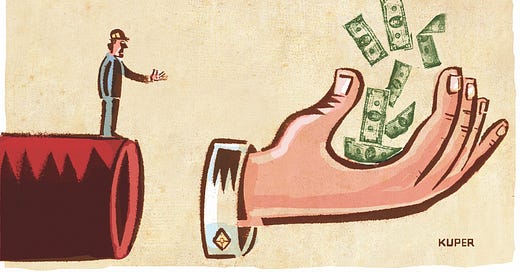America Needs New Equinomics
Something amiss?
Only one checkout line on a Friday afternoon?
Who’s in charge here?
Someone is responsible. The likely suspect is the manager angling toward a performance bonus based on how much sales exceeds expenses. Said manager might just be trying to remain employed. Fewer workers, less overhead.
Customers – once always right – have been depersonalized into quantifiable consumers. We have no say in the matter.
Something amiss?
The rich keep getting richer at the expense of the rest of us. The “maldistribution of wealth and income,” as described by Oklahoma’s populist Sen. Fred Harris, has seen the wealth inequality gap skyrocket since the advent of Reagonomics 40 years ago.
According to Statista.com, “In the third quarter of 2023, 66.9% of the total wealth in the United States was owned by the top 10% of earners. In comparison, the lowest 50% of earners only owned 2.5% of the total wealth.”
That site explains what this represents:
“Over the past 50 years, the CEO-to-worker compensation ratio has exploded, causing the gap between rich and poor to grow, with some economists theorizing that this gap is the largest it has been since right before the Great Depression.”
Technically, the Keynesian wealth sharing of the New Deal, Fair Deal and Great Society that made our middle class the envy of the world was replaced by the Friedman Doctrine that deified corporate profits.
Last December Daniel De Visé of USA Today quantified the results of Reagonomics via Federal Reserve statistics: “More than one-quarter of all household wealth, 26.5%, belongs to Americans who earn enough money to rank in the top percentile by income.”
This compares to the nearly 26% of the wealth held by the 60% of the households that constitute the American middle class.
Feel the trickle yet?
Ten years ago, Walters’ own Sen. Harris observed, “We’ve cut taxes for rich people and corporations. Strange but true, in a country that professes to believe in the value of work, we tax money earned from work a lot harder than we tax money earned from money.”
In April, Michael Mechanic of Mother Jones reported that, “The combined wealth of the nation’s 806 billionaires has nearly doubled since 2017.”
And what happened then? “(C)ongressional Republicans unilaterally rammed through a package of widely unpopular tax ‘reforms’ skewed in favor of America’s most affluent.”
This situation would worsen if non-fascist Republicans endorse the party line instead of their own economic interests by putting Donald Trump back in the White House.
Kimberly Clausing and Mary E. Lovely reported for the Peterson Institute for International Economics in May that, “Trump's proposed tariffs and tax cuts would hurt low-income Americans the most.”
Trump is “proposing to reduce U.S. reliance on income taxes while increasing our reliance on import tariffs. He proposes extending expiring tax cuts from 2017 and has also suggested possible new rounds of tax cuts. At the same time, he has proposed a ten percent "across-the-board" tariff and a 60% or more tariff on imports from China.”
Trump’s fascination with tariffs is perplexing. Increasing the tariffs on imports means that American consumers – not China or any other country – would pay more for those products at a time when more and more of our consumer goods are imported.
Tariffs? Really?
More than 200 years ago the Jeffersonian economist John Taylor of Caroline [County, VA] argued against proposed tariffs that would protect Northeastern industrialists at the expense of American consumers. In the aptly named Tyranny Unmasked, Taylor states the obvious: “no government can patronize one class but at the expense of others.”
That is just what the GOP endorses.
Taylor even expresses the sentiment of the oligarchs of his day: “I am rich, you are poor, therefore make me richer.”
Clausing and Lovely elucidate: “Together, Trump’s policies would amount to regressive tax cuts, only partially paid for by regressive tax increases. The tariffs would reduce after-tax incomes by 3.5% for those in the bottom half of the income distribution and cost a typical household in the middle of the income distribution about $1,700 in increased taxes each year.”
Trump’s plan would make the rich richer at the expense of the rest of us. No surprise considering his silver spoon origins. The wealthy Franklin Roosevelt was accused of being “a traitor to his class” for daring to share the wealth. Donald Trump will never face that criticism.
That so many people who would be adversely affected by his plans think that just fine puts their judgment in question.
Something amiss?
At the local grocery store, and at every other commercial level, someone is in charge. Democrats prefer that a truly representative government works for the benefit of all. Republicans turn the engine of the economy over to robber barons. They have served themselves well enough to buy much of Congress and the Supreme Court.
We need a new system of equinomics that will live up to our Constitutional injunction “to promote the general Welfare” – and not just line the pockets of the oligarchs.






